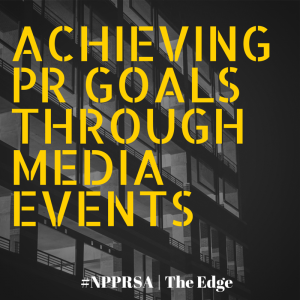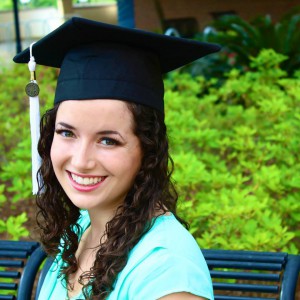 As PR professionals, we wear many different hats on a day-to-day basis: some days, we feel glued to our computers; others we are racking up mileage for various client requests around town. Sometimes we schmooze for eight hours a day, and some days we’re heads-down writing content that was due to the printer yesterday. PR work is varied but variety is the spice of life, am I right? However, one of the most sought-after aspects of the #prlife is a sparkling gem that we call a media event.
As PR professionals, we wear many different hats on a day-to-day basis: some days, we feel glued to our computers; others we are racking up mileage for various client requests around town. Sometimes we schmooze for eight hours a day, and some days we’re heads-down writing content that was due to the printer yesterday. PR work is varied but variety is the spice of life, am I right? However, one of the most sought-after aspects of the #prlife is a sparkling gem that we call a media event.
I don’t think it’s an overstatement to call media events inspiring and invigorating, and I don’t think it’s a coincidence that I leave most events with a renewed sense of purpose and a head full of new, relevant story ideas. Often times, events can transcend the press releases, pitches and follow-up calls that comprise a large amount of our public relations duties. Events give the audience something tangible to see and feel, and emotionally connect them with a company or organization.
If you pay attention to the media/competitor landscape, you’ll notice that events always cluster around the same times of the year, usually before and during large cultural events (here in Miami, there’s a lot of activity surrounding Art Basel and Miami Swim Week). You can host as many media events as your client’s budget will cover and plan it impeccably, but your effort will be for naught if you do not cut through the clutter and leverage your assets in a strategic manner. You’ve been given an incredibly effective public relations tool… let’s learn how to use it!
Give the media something that is uniquely compelling.
If you’re like me, you struggle with finding a timely hook for your stories. I’ve heard “well, I can run this story any time. Why now?” more times than I would like to admit. This is something special and unique about media events – you have the freedom to blend something that might not be as “sexy” with something that is. With events, you are free to have subject matter experts, interactive components and a highly visual presentation. Not only does this make for a highly engaging and memorable experience, but makes the company compelling and at the top of the mind for relevant future stories.
Request interview questions ahead of time.
You should do this for two reasons: one, the act of formulating and communicating interview questions fosters a deeper commitment to the event and potential story. I have found that doing this great reduces the disparity between RSVPs and actual attendees. Secondly, knowing the questions beforehand helps you better prep your clients for interviews and helps you more effectively draft key messages and suggested responses.
When media isn’t your only audience, steward the situation.
Most times, your media events will be coupled with consumer events. Generally, I like to jump this hurdle by suggesting that the event be broken into two sessions: one for media and one for consumers. If your wish is granted, use this to your advantage by allowing media “exclusive access” before the event opens to the public.
If you are not able to get two different, targeted sessions/presentations, you should request for a quiet space to be reserved for media interviews. Doing so ensures that the journalists will not be interrupted or distracted by curious bystanders. You can add additional value by pre-selecting and preparing consumers for “man on the street” interviews. This way, you can easily and quickly provide the consumer testimonials that the journalists needs while respecting the consumer’s valid third-party opinion.
Be Flexible.
We recently held a client event with DJ Irie with an outdoor photo opportunity scheduled for the early afternoon. By midmorning, the sky was threatening to ruin our perfectly timed event with a rainstorm. After some one-on-one discussions with the media, we decided it would be best to switch the indoors and outdoors component so our guests could take as many photos as their hearts desired.
Flexibility is not limited to schedule, though – you need to be able to accommodate different requests and make the most of what you have. Is the member of the media seeking more information on a topic that is not the focus of the event? As long as your spokesperson is media trained and prepared with some key messages, let them chat – monitor their conversation and d follow-up with the journalist. Does a television stations need to get in and out of the event in order to make it to some breaking news on the other side of town? Be understanding and accommodate their needs with an empty, quiet room in which they can record an interview. No need to stop the whole show to accommodate one request; just ensure that you are giving them what they need to best tell your story.
Post-event follow-up.
“Media relations” is a state of mind that you never completely slip out of, even after the event has concluded and the client has gone home. After the event is over, you’re in a special window of time where you can make an impact on the media as a respectable PR professional. In addition to an event recap, press release and event photos, you should also follow up with the individual journalists on social media. From there, be sure to stay in touch by liking and commenting on their posts. By promoting their articles and retweeting links to their stories, you can show that a professional relationship with you has even more benefits. Creating this multi-dimensional relationship helps boost your credibility and will elicit respect from the journalism community.
There is a difference between merely staffing an event to fulfill your professional obligations and thriving as a PR expert in the situation, using every avenue available to you to go above and beyond the call of duty. Use media events and various face-to-face interactions as a chance to learn more about your media contacts as people who have likes, dislikes, goals and a social life. This strategy, more often than not, becomes second nature and you form a reflex for connecting people and uncovering opportunities. By doing so, you will slowly and surely build the respectable network that will make you highly valued as a PR/Media Relations professional.
Rachel is a graduate of Florida State University (Go ‘N oles!) and is currently pursuing a Master’s degree in Strategic Public Relations from George Washington University. Currently residing in South Florida, Rachel is an Account Executive at the integrated communications firm Moore Communications Group. Rachel is a talented writer, skilled in event planning and have provided valuable account support to national and local clients including Ford Motor Company. Connect with Rachel on Twitter or LinkedIn.
oles!) and is currently pursuing a Master’s degree in Strategic Public Relations from George Washington University. Currently residing in South Florida, Rachel is an Account Executive at the integrated communications firm Moore Communications Group. Rachel is a talented writer, skilled in event planning and have provided valuable account support to national and local clients including Ford Motor Company. Connect with Rachel on Twitter or LinkedIn.
